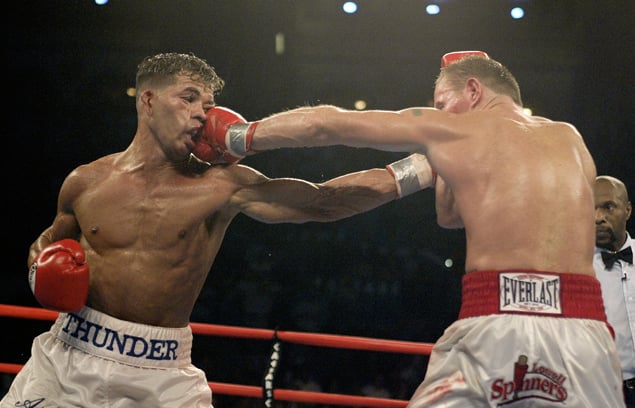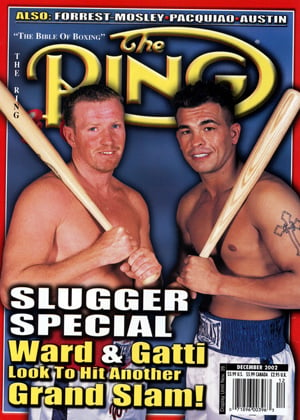‘Legendary Nights’ offers chance to relive an epic


Micky Ward and Arturo Gatti (right) trade punches during their classic rubber match at Boardwalk Hall on June 7, 2003 in Atlantic City, N.J. Gatti won a unanimous decision.
They waged war over 30 bloody rounds.
Two of those three bouts earned the distinction “Fight of the Year.”
But what really makes the story of Arturo Gatti versus Micky Ward special? They became lifelong friends, not enemies, after engaging in three of the most vicious fights fans have ever seen.
In HBO Sports’ first installment of Legendary Nights in 10 years, the network picks up where it left off with a fantastic addition to the series. Legendary Nights: The Tale of Gatti-Ward, which premieres Saturday at midnight ET on HBO, does a fine job of chronicling one of the greatest trilogies in boxing lore.
 The 75-minute documentary, with commentary from Ward and the other chief participants of those three memorable bouts, which occurred from 2002 to 2003, starts off with an image of Gatti’s tombstone with narrator Mark Wahlberg saying fighters are sometimes remembered by one night (or in this case, three nights.)
The 75-minute documentary, with commentary from Ward and the other chief participants of those three memorable bouts, which occurred from 2002 to 2003, starts off with an image of Gatti’s tombstone with narrator Mark Wahlberg saying fighters are sometimes remembered by one night (or in this case, three nights.)
Viewers get an inside look at how the fights came to fruition, with appearances by Ward’s promoter Lou DiBella, Ward’s brother Dicky Ecklund, Gatti’s promoter Kathy Duva, Gatti’s manager Pat Lynch, Gatti’s trainer Buddy McGirt, sportswriter Ron Borges and HBO Sports’ Jim Lampley and Larry Merchant.
Set against the backdrop of Ward’s trip to the International Boxing Hall of Fame in Canastota, N.Y., to see Gatti inducted this past summer, The Tale of Gatti-Ward doesn’t offer many new insights. It does, however, allow fans to relive the fights one more time.
The original graphics and commentary are used throughout the bouts and the classic music provides a nice touch.
And fans also get a peek at the negotiations that preceded the fights. One of the best parts shows DiBella talking about his vision for the events and why he wanted to match Gatti with Ward.
Another highlight features Lampley and his infamous call during Round 9 of the first fight.
“Stop it Frank, you can stop it anytime,” Lampley said during the original broadcast, a plea for referee Frank Cappuccino to put a halt to the punishing match.
Ten years later, Lampley admits it might have been unprofessional to say, but “I was out of control because the fight was out of control.”
The film does a nice job of touching on the controversy surrounding Gatti’s death in 2009 at the age of 37 and those parts are pretty emotional. It’s especially tough toward the end to see the image of Gatti’s dead body from the crime scene.
It was emotional, also, to see just how much Ward loved Gatti and how much he misses his friend. It’s rare to see opponents as such good friends outside of the ring, but it’s what made the journey of Legendary Nights so enjoyable.
“When it started it was us against them,” Duva said. “By the time it ended, it was just us.”
After Ward won the first bout, Gatti evened the score in the rematch. Gatti then won the rubber match, ending the trilogy – and Ward’s career.
But did it really matter who won the third fight? Most people didn’t pick a side and many didn’t care who won. The vitriol that makes many rivalries excellent never existed. And yet Gatti-Ward is one of the best trilogies of all time.
The documentary slows down along the stretch, particularly the scenes where Ward is at Canastota, but it brings back to life the drama and fanfare of those three fateful nights.
An emotional Merchant sums up the trilogy perfectly, saying, “Thanks guys, this is why we do it.”
This is why we do it indeed.
RingTV.com was provided a review copy of the documentary by HBO Sports.
Photo / Al Bello-Getty Images, THE RING















